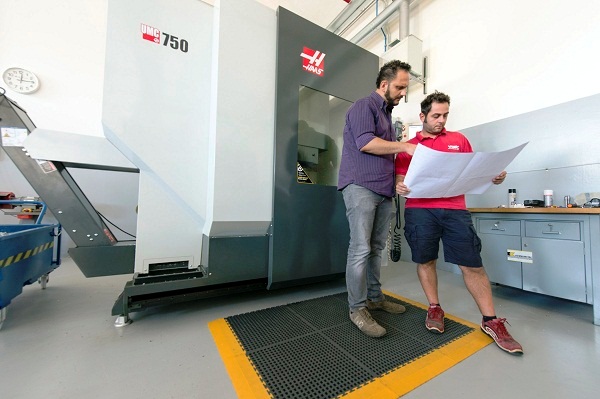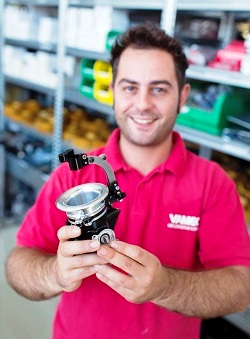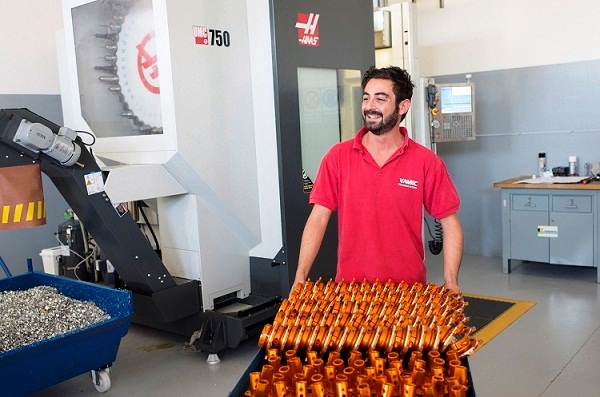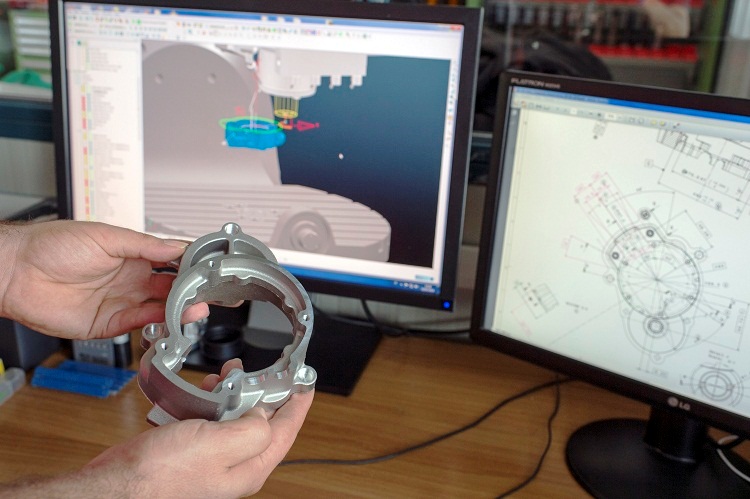Italian firm Vamec is a market-leading designer and manufacturer of carburetors for racing kart teams. The company has grown as karting has evolved from a pastime for weekend hobbyists into a globally competitive motor racing formula. During that evolution, Vamec has improved and expanded its range of products, in spite of owning some ‘challenging’ production equipment. Things are looking up, however. Lately, the company has invested in Haas CNC machine tools, including a UMC-750 universal machining center, and is benefitting from new levels of speed, accuracy and efficiency.
Vamec srl is based near Bologna in a region famed for its motorsport heritage. The city of Modena, the birthplace of Enzo Ferrari and home to Maserati and Lamborghini, is just up the road, while the legendary Imola F1 circuit and the Torro Rosso F1 team are both neighbors.
The Vamec office walls are adorned with photos of young karting stars – one time customers of the firm, who went on to become World Championship winning F1 drivers, including Michael Schumacher and Ayrton Senna no less.

Racing is in the blood at Vamec. In his day, founder Vincenzo Vannini was a passionate kart competitor who first took to the track in 1968. After subsequently becoming a preparer and mechanic for various international teams, he established Vamec in 1994 with the intention of manufacturing purpose-designed components for a sport that had previously relied on non-specific parts such as those found on motorcycles, tractors and lawnmowers.
Some 20 years later, with Vincenzo’s sons Matteo and Fabio running the workshop and business administration functions respectively, Vamec has become a world leader in the development and manufacture of components, accessories and equipment designed specifically for competition. Its Tryton carburetor series, for example, is used by both national and international kart racing teams.

In recent years, the sport of karting has moved up several gears to become as competitive and professional as the upper echelons of motor racing to which its drivers aspire. The potential rewards for talented young drivers who reach F1 are there for all to see. It’s a shot at fame and riches in which many are prepared to invest heavily.
Vamec has also invested with the sport, purchasing numerous CNC machine tools and adding components to its catalogue, including various engine and chassis parts, pit stands, jigs and tools, which are supplied to teams and individual racers all over the world. More recently, the company also made engine parts for Moto 3 motorcycle racing, and has even remade parts for a collectable Ferrari F1 car owned by a Californian enthusiast.
Vamec’s goal, according to its founder, is to be as close to the customer as possible. This approach is an insider’s strategy, after all, Vincenzo knows what it’s like to race and to run a team – he understands how valuable good support can be. “There are lots of companies that make and sell standard, replacement parts, but we want to develop our relationship so we can support customers as much as possible,” he says.
For many years, Vamec bought well-known, far-eastern CNC machine tools, until in 2013 Vincenzo placed an order for the newly launched Haas UMC-750 universal machining center. “We couldn’t believe the value offered by the UMC,” he says. “We’d heard very
good things about Haas machines, so we placed an order even though we knew the machine had only just been launched and the delivery date was quite a way off.”
In the meantime, Vamec looked at other Haas machines to see if they also offered similar value and performance. The company quickly decided to invest in a VF-2SS super speed vertical machining center, mostly for one-off, three-axis work. “All of our other machines were busy, so we needed another,” says Matteo. “Again, the price and claimed performance of the VF-2SS were very attractive. As soon as it was installed we moved one or two jobs from the adjacent Japanese machine. We had to make some very minor modifications to the program so it would run on the Haas control, but that was straightforward. The first part we made, well, we just couldn’t believe it! The Haas did the job better than a machine that cost a lot more. The surface finish was better and the cycle times were shorter.”
A little later, in July 2013, the company took delivery of its UMC-750, and soon, Matteo says, the machine was making 70-80 different parts, mostly one-offs.
“Thinking in five axes was new to me,” he recalls, “so I took it slowly to start with. It’s not that the machine is difficult to use – on the contrary, the control is the same as the VF-2SS, so it was immediately familiar. It’s the CADCAM part of the process that is different and took a little longer to understand. Of course, our need for accuracy and capability will only increase over time, but we are in a very good position now that we have access to an affordable, very good machine like the UMC.”

Despite Vamec’s successful efforts at diversification, karting will for the time being remain its core business. The company has an impressive roster of 250 clients worldwide, with countries such as the USA and Brazil providing more recent opportunities to grow its business.
“Karting has gone from being a low cost, amateur sport to being technology led and very well financed,” says Matteo. “It’s certainly not the industry my dad started in, all those years back.” Indeed, it’s not even the industry in which the likes of Senna and Schumacher began their careers. Today karting is regulated by the FIA, which means new products must be homologated. Of course, this adds cost, just like US medical companies making products under the watchful eye of the FDA, for example.
“Fortunately, Haas machines give us the technology to do what we want to do, quickly and cost effectively,” concludes Matteo. “Furthermore, there’s no need to lease the machines or get a big loan from the bank; they’re affordable and reliable.”
Matteo may have studied electronics, but he has steadily nurtured his passion for mechanics; the latest Vamec carburetor is all his own design. He’s self-taught and a good example of how ingenious, hard-working individuals can be vital to the health and success of an industrial nation’s economy, providing they have access to the right technology.
Italy has a long and distinguished heritage in motor racing and high-performance road cars, which began with passionate and talented individuals. With Haas CNC machine tools in their workshops, the latest generation, like Matteo and Fabio Vannini, could ensure the country’s motorsport industry also has a long and distinguished future.


